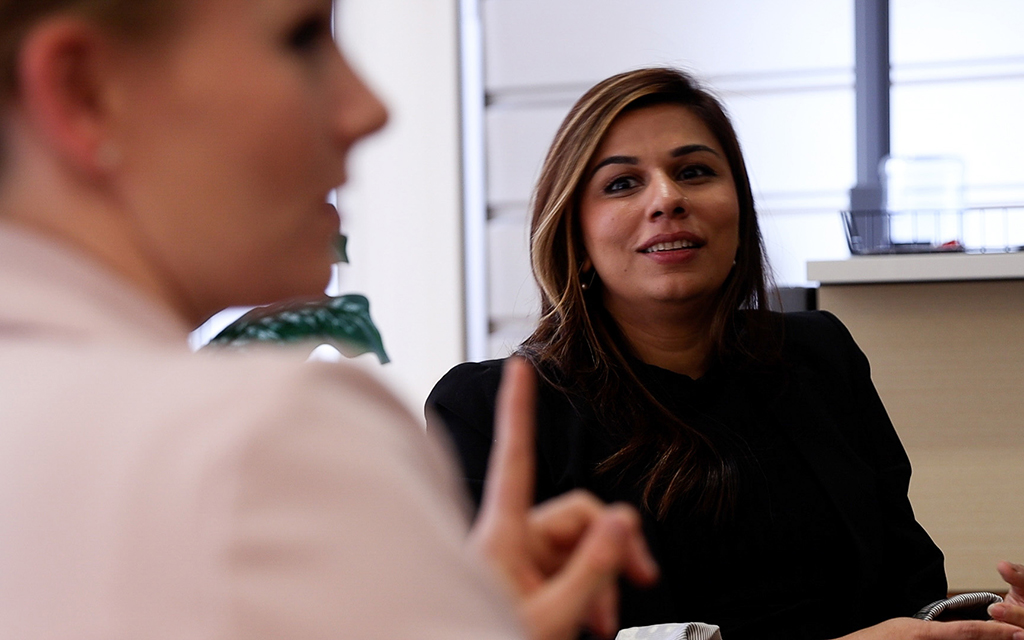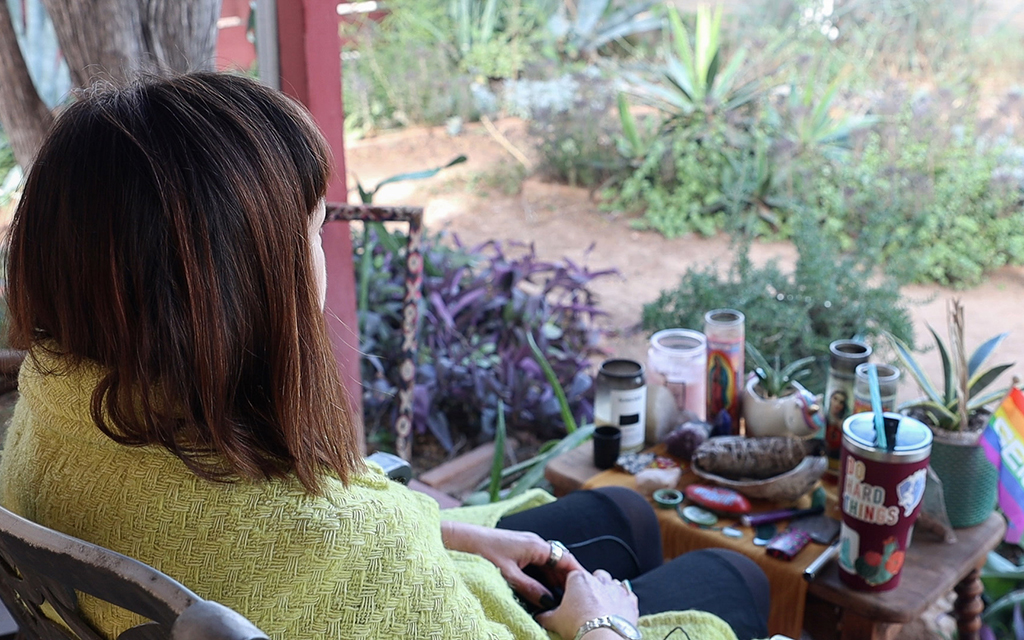TUCSON – When Allison was diagnosed with bipolar disorder at age 18, doctors told her she would never be able to have children because the medication she used could diminish her chances of having a healthy pregnancy.
Years later, when she started to dream of having a family of her own, Allison began to question her doctors’ advice and took matters into her own hands.
“Back in 2003 when you were diagnosed with this, they would tell you that you couldn’t have kids because you would have to be on medication your whole life – and you couldn’t have kids with medication,” she said. “It wasn’t until I got older and realized I wanted to have kids that I realized I had to start reading more about it.”
But Allison, who asked that only her first name be used because of concerns about mental health stigma, did far more than that.
Before she got pregnant, Allison met with Dr. Saira Kalia, a perinatal psychiatrist at the University of Arizona College of Medicine, to explore how she could have children while protecting her health – and theirs.
Today, the 37-year-old owns a styling business and works as a sexual violence prevention specialist in Arizona. She is also the mother of twins who turn 2 in January. But the journey wasn’t easy.
Kalia said Allison’s willingness to seek out help was admirable – but unusual.
“A lot of times, patients aren’t good at figuring out what’s going on,” Kalia said. “There’s levels of bias, stigma – limitations already existing for that population. Then you add in the issues of, if you’re trying to get pregnant, fertility, pregnancy, postpartum, breastfeeding. The layers just stack on.”
Research shows that mental health conditions are the most common complication during the perinatal period, often defined as one year before to a year or two after the birth of a child. One in five people will experience a mental health condition during this time, and people of color, those with lower incomes and LGBTQ individuals are disproportionately affected.
Mental and behavioral health conditions are also a leading cause of maternal mortality in the U.S. In Arizona, nearly half of all pregnancy-associated deaths are due to mental health or substance use issues, according to the Arizona Department of Health Services, and an estimated 98% of those deaths are preventable.
Kalia and Dr. Kathryn Emerick, also a perinatal psychiatrist at the University of Arizona, are teaming up to address the problem.
The pair are working to launch a statewide hotline next spring for providers who serve the perinatal population. Instead of trying to connect patients directly to psychiatrists, the resource hotline will connect health care providers directly to psychiatrists to facilitate consultations about a patient’s mental health.
“The idea would be that they could call the line and they would get connected to a perinatal psychiatrist within two or three minutes, be able to talk through the case, and get direct recommendations,” Kalia said.

Dr. Saira Kalia, right, discusses the importance of access to perinatal psychiatry with Dr. Kathryn Emerick in Tucson on Nov. 3, 2022. Kalia believes that making psychiatry more available to women before, during and after pregnancy can help society more broadly. “It’s never just the woman you help,” Kalia says. (Photo by Laura Bargfeld/Cronkite News)
The initiative, funded via the Arizona Health Care Cost Containment System, also will offer free training for providers across the state who want to learn more about maternal mental health. Down the road, Kalia hopes to facilitate access to psychiatric treatment when a patient needs an extra level of attention.
Perinatal psychiatry access programs exist in 19 states, according to Dr. Nancy Byatt, a perinatal psychiatrist who launched the first such program in 2014 in Massachusetts. Funding models vary. Some programs receive federal grants while others rely on dollars from the state.
Byatt said she saw a need and wanted to find a way to respond.
“I was seeing a lot of pregnant and postpartum women. … All these patients were waiting a long time to see me,” Byatt said. “We provide training, consultation, resources and referrals to build the capacity of the professionals who are already working with these pregnant and postpartum women and thereby increase access to care.”
Byatt said early research suggests the program has made a difference in maternal mental health outcomes in Massachusetts. For instance, women who are part of the program are more likely to initiate mental health treatment and get follow-up help.
“When people are served or enrolled in practices served by our programs, that’s associated with an improvement in depression outcomes,” she said. “We found that the more people call, the better the outcomes are, so that’s also exciting.”
Most people who need mental health support during the perinatal period never receive treatment. Part of the problem is societal pressure that many new parents, especially women, feel to be perfect and meet certain expectations, Kalia said. To acknowledge having unpleasant feelings or thoughts often flies in the face of what new parents believe they should be feeling.
And although some pregnant people may have preexisting mental health conditions, Kalia said many more have never been diagnosed with a condition or received mental health treatment before.

Dr. Saira Kalia works in her office in the psychiatry department of Banner-University Medical Center South in Tucson on Nov. 3, 2022. Research shows that mental illness is among the most common complications of pregnancy. Kalia and her colleague, Dr. Kathryn Emerick, are teaming up to address the problem. (Photo by Laura Bargfeld/Cronkite News)
“Any issues that you had with your own childhood – adverse childhood events, difficult relationships with your mom, abuse, trauma and neglect as a child – when you’re bringing a child in, there’s no way but to think about your own space,” she said.
The larger issue with access to perinatal mental health treatment may be structural, though.
The United States faces a shortage of mental health care providers, and Arizona is no exception. Although most people see health care providers 20 to 25 times during the perinatal period, many providers are not trained to recognize, diagnose or treat common maternal mental health conditions, such as depression and anxiety.
Kalia said Arizona’s program will serve the entire state but focus in particular on counties with high birth rates or low access to care. Greater access to mental health care during pregnancy and postpartum could change lives, she said.
“It’s a really uncomfortable feeling as a provider to be like, I wish I knew more,” Kalia said. “I think we’re empowering them to be like, ‘OK, you’ve got this.’”
As for Allison, access to mental health care during her pregnancy made a difference.
“It was just really great to have this extra expert opinion about what I was choosing to do and how I could go about it the safest way for me and my twins,” she said.
Allison recently began advocating for mothers with mental health conditions on TikTok and Instagram. She said she wants to show others that it is possible to have a family despite mental health diagnoses.
“There weren’t actually that many bipolar moms on the internet saying, ‘Hey, I’m healthy. I’m happy,’” Allison said.



